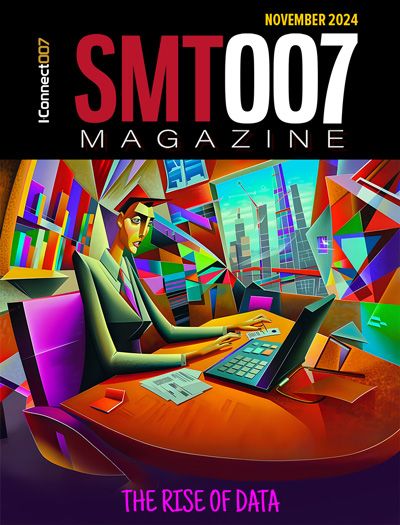-

- News
- Books
Featured Books
- smt007 Magazine
Latest Issues
Current Issue
The Path Ahead
What are you paying the most attention to as we enter 2025? Find out what we learned when we asked that question. Join us as we explore five main themes in the new year.

Soldering Technologies
Soldering is the heartbeat of assembly, and new developments are taking place to match the rest of the innovation in electronics. There are tried-and-true technologies for soldering. But new challenges in packaging, materials, and sustainability may be putting this key step in flux.

The Rise of Data
Analytics is a given in this industry, but the threshold is changing. If you think you're too small to invest in analytics, you may need to reconsider. So how do you do analytics better? What are the new tools, and how do you get started?
- Articles
- Columns
Search Console
- Links
- Media kit
||| MENU - smt007 Magazine
Are Firms Holding Too Much Inventory?
October 30, 2024 | Shawn DuBravac, IPCEstimated reading time: 1 minute
In the aftermath of the 2008 financial crisis, manufacturers made significant adjustments to inventory management strategies as they faced sharp declines in demand and economic uncertainty. Manufacturers moved to scale back production and attempted to quickly reduce inventory levels. Post-crisis, many manufacturers adopted lean inventory practices, such as just-in-time (JIT) production, to minimize holding costs and illiquidity risks.
The crisis highlighted the risks of large inventories during periods of volatile demand and price fluctuations, prompting a greater focus on supply chain efficiency. While some sectors recovered quickly, others—particularly those reliant on consumer spending and credit markets, such as automotive and durable goods—experienced a slower rebound. Manufacturers remained cautious about overstocking, and inventory restocking was gradual and deliberate, aligning more closely with demand to create a responsive and flexible supply chain.
The lean inventory strategies adopted post-2008 had significant consequences during the COVID-19 pandemic. The JIT model, which minimizes on-hand inventory, left many manufacturers vulnerable to the widespread disruptions caused by lockdowns, factory shutdowns, and transportation delays. As a result, industries like medical supplies, electronics, and automotive components faced severe shortages. Long global supply chains, especially for critical components, exacerbated the situation. With no buffer stock, many manufacturers were forced to halt production.
In the initial aftermath of the pandemic, demand surged for certain products, such as home electronics and medical devices, while demand plummeted for others, such as automobiles and fashion. This rapid shift created both overstocking and understocking across sectors. Uncertainty amplified demand forecasting errors, leading manufacturers to over-order to avoid shortages and exacerbating manufacturing bottlenecks.
To read the rest of this article in the Fall 2024 issue of IPC Community, click here.
Suggested Items
Altus to Highlight Key Manufacturing Solutions and Trends at Southern Manufacturing & Electronics 2025
01/15/2025 | Altus GroupAltus Group, a leading distributor of advanced electronics manufacturing equipment in the UK and Ireland, will showcase a selection of cutting-edge solutions at Southern Manufacturing and Electronics 2025 from 4-6 February at the Farnborough International Exhibition Centre..
Ensuring Compliance With the U.S. CHIPS Act: Identifying the Source of Electronic Components
01/13/2025 | Dr. Eyal Weiss, CybordThe U.S. CHIPS Act aims to strengthen domestic semiconductor manufacturing and enhance supply chain security. As part of this initiative, manufacturers must ensure compliance with specific regulations regarding the sourcing of electronic components. This white paper provides an overview of the compliance requirements, relevant laws and standards, and introduces innovative technological solutions to verify the provenance of electronic components.
Global Sourcing Spotlight: The Surprising World of Offshore B2B Industrial Values
01/08/2025 | Bob Duke -- Column: Global Sourcing SpotlightWhen people want to buy industry products, they often look at a list of products: PCBs, PCBAs, injection molding, batteries, and transformers. However, if you bypass brick-and-mortar facilities, you can usually find better-value products if you search the globe. This is especially true with B2B products. With the right strategy and a keen eye for quality, companies can uncover opportunities to source essential industrial products from offshore suppliers at competitive prices. Here’s a list of some of those products and where to source them.
Electronics Industry Sentiment Dips in December
01/03/2025 | IPCThe electronics industry faced a dip in sentiment this December, as the Demand Index declined 1.8 percent according to IPC’s December Sentiment of the Global Electronics Manufacturing Supply Chain Report. It remained below 100 for the fourth consecutive month, signaling continued contraction.
EIPC Technical Snapshot: Factors Driving the Fluctuating Demand for PCBs
12/11/2024 | Pete Starkey, I-Connect007EIPC continued its series of online Technical Snapshots with a webinar on Nov. 21 presented by Dr. Hayao Nakahara of N.T. Information Ltd, who summarised world PCB production and shared his vision of the market over the next five years. With information gathered from many sources, Nakahara examined factors driving the increasing demand for printed circuit boards.


